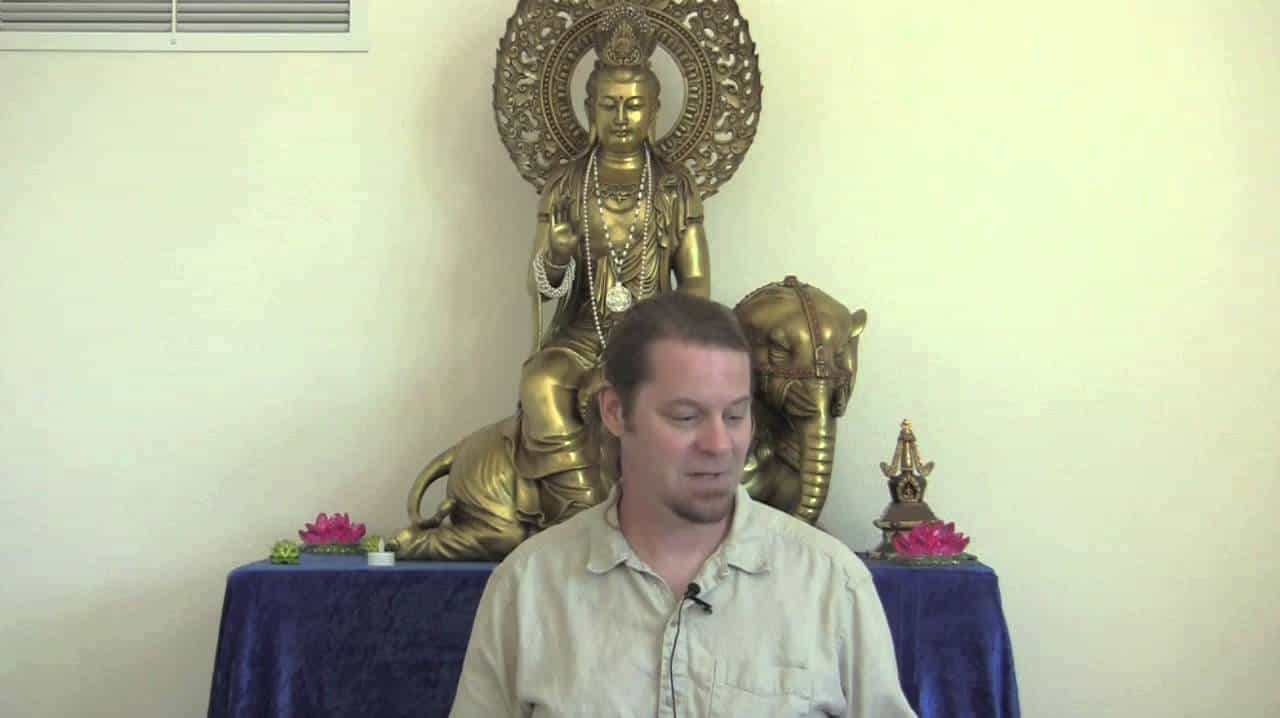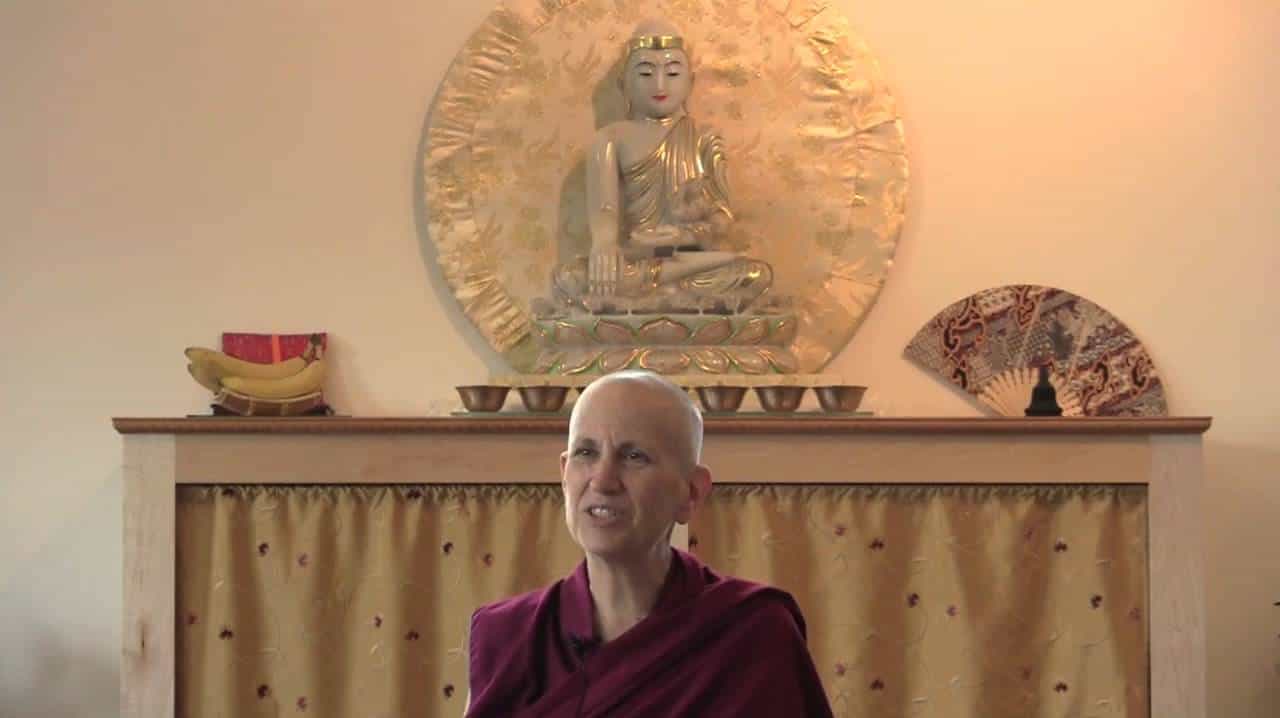Verse 16: The load of contaminated aggregates
Verse 16: The load of contaminated aggregates
Part of a series of talks on Gems of Wisdom, a poem by the Seventh Dalai Lama.
- Our five polluted aggregates are conditioned by afflictions and karma
- There is no security in samsara
- Generating wisdom and compassion is the way to lasting peace
Gems of Wisdom: Verse 16 (download)
On verse 16 now:
“What is the load heavy to carry, difficult to put down, and always harmful?”
Think of the verse you say when you’re taking the eight Mahayana precepts. Might give you a clue.
The contaminated aggregates. “One’s own samsaric aggregates that are conditioned by karma and afflictions.”
What is the load heavy to carry, difficult to put down, and always harmful?
One’s own samsaric aggregates that are conditioned by karma and afflictions.
Our contaminated aggregates, or our polluted aggregates. The pollution means that they are under the influence of ignorance. Not under the influence of wisdom and compassion, but under the influence of ignorance.
We have the five aggregates. Together they make up the body and the mind. The form aggregate is the body, then we have four mental aggregates: feelings, discriminations, volitional factors (conditioning factors, which is a grab-bag for everything you don’t know where to put), and then the fourth one is the primary consciousness. These are what we say make up the person. Or we can say they’re the basis of designation of a person. In dependence on these five then the person is imputed or designated.
They’re conditioned by ignorance and karma in the sense that through our mind that misapprehends how we exist and how phenomena exist then we generate attachment, anger, jealousy, pride, laziness, all the other good ones…. You know, all the things that make you feel miserable inside. Then these things—except attachment, it kind of makes us feel good for a while until we don’t get what we want, then we’re stuck in misery—but by means of these different mental afflictions then we do actions: (for example) elevating our status, manipulating people, trying to get what we want, destroying what we don’t like. Those actions then leave karmic seeds, or karmic latencies, on our mindstream. When the causes and conditions come together, then the residual energy leftover from our actions—these karmic latencies or karmic seeds—they ripen and they influence what we get born as, what we experience, our habitual actions, the environment we’re born in. They influence many different things about our lives, including the primary one, what we’re born as. What aggregates we get—what body and mind that we take—is governed by the ignorance, the afflictions, and then all the actions that we do.
It’s in that way that we’re not free. We’re confined by the ignorance and the polluted karma that we create. Once we’re born in these aggregates—once we have this body and mind—then we’re really not free. We like to think we’re free. How free are we? We have a body that gets old and sick and dies without asking us permission. And we can’t control it. It’s going to get old no matter what we do. It’s going to get sick. It’s going to die at the end of the day. We’re totally enslaved to this body that’s going to do whatever it wants based on ignorance and the polluted karma. The same with our mind. We sit down to meditate and the mind goes off here, goes off there. We have all sorts of emotions that we don’t really want to have. And then we say I don’t want to have this emotion, I want to get rid of it, and there it is anyway. So even our minds aren’t free. Simply because of these habit patterns, simply because of ignorance and its influence on our life.
That’s why the body and mind we have is less than satisfactory, and why the Seventh Dalai Lama is calling it “the load heavy to carry.” It’s like the person is the porter and the aggregates are what we’re carrying along with us. We want to be happy, but what do we have on our back? This pile of five really heavy bricks. So it’s heavy. “Difficult to put down.” We don’t want to put it down because we’re so attached to it. I mean, we’re very attached to our body, aren’t we? Our body gets sick, it gets old, it dies. And yet we love this body. Isn’t it strange?
I’m not saying we should hate our body, and killing ourselves certainly doesn’t do any good. It only does harm. But it’s strange how this body—which is not the source of long-term happiness or security, or well-being—is something that we’re so attached to and we don’t want to put down. Because at the end of life, when we’re leaving this body the mind says, “I want another one! Give me another one! Because I need an identity! And a body gives me an identity.” So then, propelled by afflictions and karma and ignorance the mind gets attracted to another body and there we go again, replaying the whole scene.
“Heavy to carry, difficult to put down, and always harmful.” In other words, no matter what we get reborn as, as long as our body and mind are under the influence of afflictions and karma there’s going to be no lasting peace. No matter what we get reborn as, no matter how much money we have, no matter how much social status we have, no matter whether the world thinks that we’re the best thing it ever had and everybody in the world loves us…. None of those things are going to solve the problem of having a body and mind under the control of afflictions and karma. The only way to solve that problem is by generating the wisdom that realizes the opposite of what ignorance grasps at. In other words, the wisdom that realizes how things actually exist has the power to overcome the ignorance. When the ignorance is overcome then the afflictions can’t arise, then we stop creating the karma to take rebirth. Then, if you’re in the bodhisattva path, you start developing the abilities to manifest different bodies in different places in the universe to be of benefit to other living beings. So we’ve got to do something with these five contaminated aggregates. That’s what he’s saying. And wisdom is the solution.
Otherwise, pampering these five aggregates…. We’ve been doing that since beginningless time. It’s like, how much pleasure can you experience with your body before it just gets to be a rerun of what you’ve done before. I mean, you go out drinking and drugging, you feel great, until the next morning. Then you’ve got to do it again. You go out and you have a relationship, and it’s fantastic, until it isn’t. And then you’ve got to go find somebody else. You have the perfect job, which is super-duper, until things go wrong. You know? It’s like, within cyclic existence there’s no opportunity for lasting peace in our minds. Or any kind of lasting security.
Because we’re always seeking security within samsara. Samsara means this thing of taking rebirth again and again and again under the influence of ignorance. We’re always looking for some kind of security. “I want to fix everything and make it just the way I want it, and then it’s going to stay that way.”
Is that possible? It would mean stopping time. It would mean that nothing would ever change, everything would be frozen. Is that possible? To make things that are in the nature of changing every moment, to freeze them? Impossible. So trying to arrange our duckies and freeze it, you know? It’s like, okay, I’m going to take a picture and now it’s frozen and everything’s going to stay like that…. Impossible.
Generating wisdom and compassion are the only way to find some kind of lasting peace and relief. And joy.
[In response to audience] Okay, you do the same thing again and again, and it’s like, “Oh, it’s so sad that I do this. Oh, woe is me.” And you get depressed. Instead of saying, “Now, I’ve got to get out of cyclic existence.”
Well, part of that happens, first of all, because you’re not having the worldview of cyclic existence, you’re just having the worldview of this life. And you’re still grasping at the happiness of this life. Because…. Why do we get sad? Because I don’t have the happiness of this life. If you continually develop the worldview of this is just one life amongst infinite previous beginningless lifetimes, and why am I here? Because of ignorance. And what is the meaning of my life? And how can I make it meaningful? Then when you see that these things—you keep doing the same things again and again and it’s not working…. Then you start saying, “Oh, I can do something different.” But as long as the mind is still saying, “But I want the happiness of this life. And it’s so sad that I’m not getting it. And I want to be a Dharma practitioner and be enlightened, but I also want the happiness of this life, too. I don’t want to give up anything.” Right? I want my cake, and I want to eat it, too. And I want nirvana to come without creating the causes for it, because I’m too busy being involved in my samsara and enjoying it. And it’s so sad if I can’t get all that happiness I want.
[In response to audience] Oh yes, “I’m such a bad Dharma practitioner!” Whip whip whip. Beat beat. [laughter]
Venerable Thubten Chodron
Venerable Chodron emphasizes the practical application of Buddha’s teachings in our daily lives and is especially skilled at explaining them in ways easily understood and practiced by Westerners. She is well known for her warm, humorous, and lucid teachings. She was ordained as a Buddhist nun in 1977 by Kyabje Ling Rinpoche in Dharamsala, India, and in 1986 she received bhikshuni (full) ordination in Taiwan. Read her full bio.


